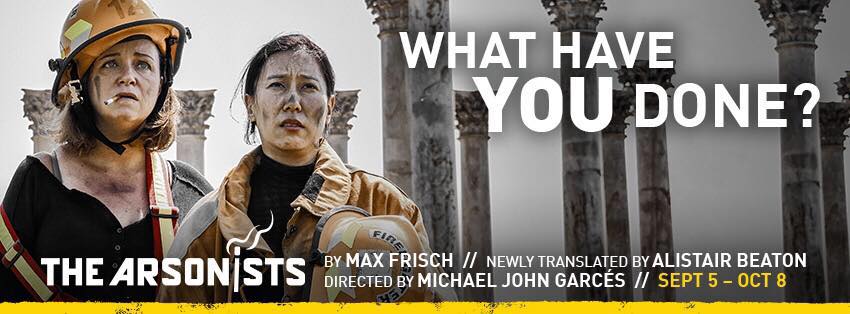Everything burns, but not every fire is determined by fate. And Washington DC is certainly on fire in various meanings of the word. Politically, socially, and now thanks to Woolly Mammoth Theatre Company, theatrically as well! This is one fire that fate will not put out! The kickoff to Woolly Mammoth’s Incendiary 2017/2018 season— The Arsonists, by Max Frisch and newly translated by Alistair Beaton, is setting the stage and minds of audience members alike ablaze with a conflagration that just won’t quit. Directed by Michael John Garcés, this powerfully thought-provoking piece has such stoic and striking relevance to the world at large, both politically and communally, that’s it’s the obvious choice to open this year’s fiery season.
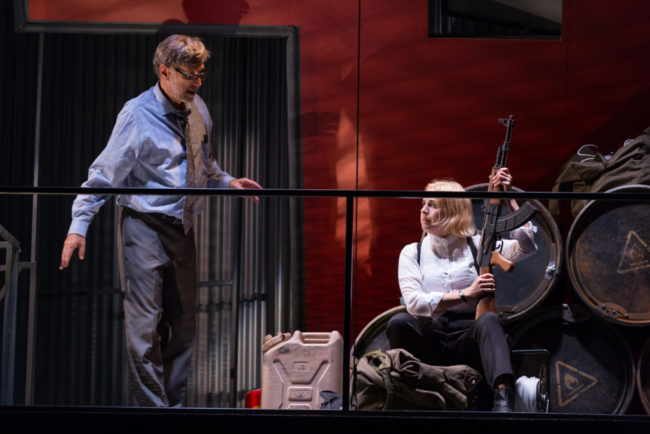
With a deceptively simplistic three-quarter thrust layout, Set Designer Misha Kachman literally thrusts the action of the Betterman household into the audiences’ faces. While there is precious little to the interior décor, and a great deal of the visual spectacle is accomplished through the work of Lighting Designer Colin K. Bills and Video Designer Jared Mezzocchi (who does an exceptional job of gathering a collection of disturbing, and tragically real disastrous news clips to play in an almost unending loop of continuality on the television screen in the background), Kachman’s set is impressive all the same. There’s much that can’t be said about it, and much like one of the overarching themes of the play, you’ll have to trust that it pays off in the end.
There is a smoldering energy shared across the cast, primarily ignited by the Chorus, but carried with expedience and intensity by Sound Designer James Bigbee Garver and Composer Chard Clark. The original soundscape that burbles like lava waiting to erupt beneath the scenes and between scenic transitions is incendiary, following suit with the entire seasonal theme of fire. Ready to erupt in a towering inferno, the unique soundscape that Clark and Garver create is well suited for this intensely situated drama, keeping the audience at the edge of their seat as the characters delve further and further into the politically charged madness of the piece.
Director Michael John Garcés pulls and pushes the audience in and out of the experience, keeping them perpetually unbalanced as the characters go through their dramas by fully integrating the Chorus into the audience as well. They are observers, yet included in the action; they are watchers, yet they are doers. Garcés masters this approach to the Chorus (Akeem Davis, Peter Howard, Sue Jin Song, José Joaquín Perez, Emily Townley) by making them physically ubiquitous. They are seated beside you, they are on stage at the edges, they move about through the house— at one point they’re even all up on catwalk high above the audience and stage— they are everywhere. This creates an eerie sense of perpetually being watched. In what world do we live where everyone’s actions are currently being monitored, even if it is for their own good? Garcés’ approach to this ‘Big Brother’ mentality could not be more relevant or strongly articulated and serves the production well in driving home a great deal of political impact in this fashion.
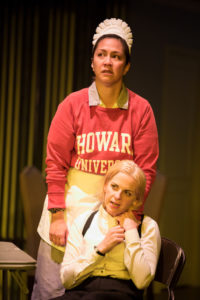
Though Anna (Regina Aquino) is merely the household help inside the Betterman home, Aquino is a lively addition to the cast, making her presence felt, primarily through her facial expressions and body language, using both as an extension of what few words she’s given to express. As the end of the production unravels, Aquino’s facial expressions are particularly disturbing, haunting with the truth of the situation that she seems to have been aware of all along. Similar expressions are found on Bahni Turpin’s face playing Becca Betterman, the wife of Mr. Betterman. Though with far more dialogue exchanges, and even an aside of her own addressed at the audience, it is still Turpin’s facial expressions that give her character the most life in the performance.
Though Billie Irons (Kimberly Gilbert) isn’t initially introduced in the early phases of the performance, once she arrives, you’re certain to know it. Gilbert masterfully handles the manipulative nature of the character of Billie, making it cloyingly sweet to the point of revolting once she starts practicing these manipulative tactics against Betterman. Excited to the edge of deranged, and enthusiastic in a cracked psyche fashion, Gilbert grounds into this neurotic energy and uses it to fuel the more detrimental moments of her character, like during the singing near the show’s conclusion. Gilbert creates a frightening monster whose sanity is questionable at best, particularly when engaging with Joe (Tim Getman.)
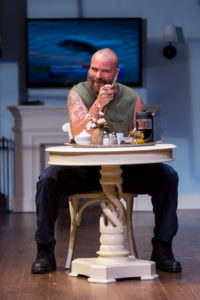
Terrifying and monstrous in the way he physically carries the body of the Joe character, Tim Getman is a beast on stage. There is a questionable moment— a directorial choice— as to why an additional painted spider tattoo on the back of the actor’s neck is necessary (after the actor gets good and sweaty it bleeds all over the place) when Getman has so many of his own tattoos, which lends themselves to the intimidating nature of the character. This small detail has little to do with Getman’s performance, though actually seems like a slight to his acting ability as he carries the ferocity and intensity of the character off so well with his growling, larger than life personality, and approach to Joe’s mannerisms that an excessive tattoo hardly seems necessary. Getman is terrifying to behold, fulfilling the intent of both playwright and translator, and the way he executes his interactions— particularly when manipulating Betterman and Mrs. Betterman through intimidation and reverse psychology— with every character feels frighteningly honest, as if there truly could be a monster lurking within his conscience.
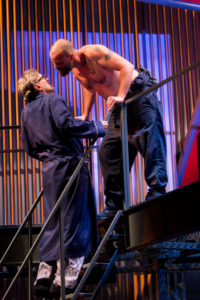
As for Mr. Betterman (Howard Shalwitz) there is a simplicity to him that is inescapably naïve. Shalwitz delivers a brilliant performance, honing the delicate balance between stupid and naïve, tempering it with the desperate notion of hope. Carefully articulating a fine quote— “…if we assume everyone is an arsonist, how will it ever get better? We need a little trust, a little faith, we cannot live in fear…”— Shalwitz hits the core of the issue with a solid blast of honesty and fear. Representing the blind everyman, who is so afraid that they fall victim to faith and trust, Shalwitz augments the political overtones and social undertones that are carved into the foundation of the play, driving it home to America’s current political climate tenfold.
A remarkable piece of theatre that is starting a blaze of conversation all across Washington, The Arsonists is the most politically relevant thing to pop up in the district so far this autumn, and shouldn’t be missed!
Running Time: Approximately 2 hours without an intermission
The Arsonists plays through October 8, 2017 at Woolly Mammoth Theatre Company in the heart of DC’s Penn Quarter neighborhood— 614 D Street NW, Washington DC 20004. For tickets, call the box office at (202) 393-3939 or purchase them online

